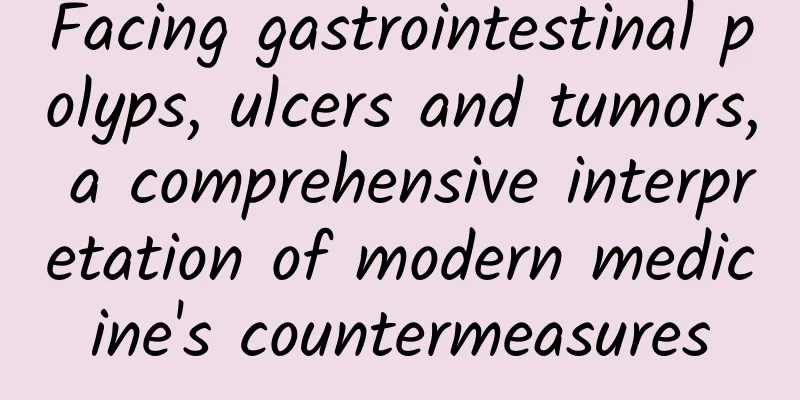Facing gastrointestinal polyps, ulcers and tumors, a comprehensive interpretation of modern medicine's countermeasures

|
Gastrointestinal polyps, ulcers and tumors are common diseases of the digestive tract, posing a great threat to people's health. According to a recent domestic study, about 35% of adults have gastrointestinal polyps. The prevalence of peptic ulcers is also high, with about 15% of adults suffering from this disease. The incidence of common digestive tract malignancies, including gastric cancer, colon cancer, and rectal cancer, is on the rise. It is urgent for people to pay more attention to such diseases. Fortunately, with the continuous development of modern medicine, the diagnosis and treatment of these diseases are becoming more and more perfect. This article will comprehensively interpret the strategies of modern medicine in dealing with gastrointestinal polyps, ulcers and tumors to help readers better understand these diseases and their treatment methods. 1. Strategies for dealing with gastrointestinal polyps Gastrointestinal polyps refer to abnormal tissues protruding from the surface of the gastrointestinal mucosa, which can be benign or malignant. Modern medicine's strategies for dealing with gastrointestinal polyps mainly include the following aspects: 1. Endoscopic examination and diagnosis Endoscopic examination is an important means of diagnosing gastrointestinal polyps. Through endoscopy equipment such as gastroscopes and colonoscopes, doctors can visually observe the condition of the gastrointestinal mucosa, find polyps and perform biopsies. The biopsy results can determine the nature of the polyps and provide a basis for formulating treatment plans. 2. Polypectomy For gastrointestinal polyps that are found, modern medicine usually uses endoscopic polypectomy for treatment. This method has the advantages of less trauma and quick recovery, and is suitable for most polyp patients. For larger polyps or malignant polyps, surgical removal may be required. 3. Follow-up and monitoring Patients with gastrointestinal polyps need to be followed up and monitored regularly after treatment. Endoscopic examination and other means can be used to promptly detect the recurrence or malignancy of polyps so that appropriate treatment measures can be taken. Strategies for coping with gastrointestinal ulcers Gastrointestinal ulcer refers to inflammatory defects in the gastrointestinal mucosa, which are common in the stomach and duodenum. Modern medicine mainly adopts the following strategies to deal with gastrointestinal ulcers: 1. Medication Drug therapy is the main treatment for gastrointestinal ulcers. Drugs such as inhibiting gastric acid secretion and protecting gastric mucosa can alleviate ulcer symptoms and promote ulcer healing. Commonly used drugs include proton pump inhibitors, H2 receptor antagonists, etc. 2. Eliminate the cause Regarding the causes of gastrointestinal ulcers, modern medicine emphasizes the importance of eliminating the causes. For example, for ulcers caused by Helicobacter pylori infection, antibacterial treatment is required; for ulcers caused by nonsteroidal anti-inflammatory drugs, the drug dosage needs to be adjusted or the drug needs to be replaced. 3. Dietary adjustments Diet adjustment is also important for the treatment of gastrointestinal ulcers. Patients should maintain a regular diet, avoid spicy and irritating foods, and consume more foods rich in vitamins and fiber to promote ulcer healing. 3. Strategies for treating gastrointestinal tumors Gastrointestinal tumors are serious diseases of the digestive tract, including benign and malignant tumors. Modern medicine mainly adopts the following strategies to deal with gastrointestinal tumors: 1. Early screening and diagnosis Early screening and diagnosis are crucial for the treatment of gastrointestinal tumors. Through blood tests, endoscopy, imaging examinations and other means, tumor lesions can be detected in a timely manner to provide a basis for formulating treatment plans. For high-risk groups, regular gastrointestinal endoscopy is recommended to detect tumors early. 2. Comprehensive treatment Treatment of gastrointestinal tumors usually requires a combination of treatments, including surgery, chemotherapy, and radiotherapy. Doctors will develop a personalized treatment plan based on the patient's specific condition and stage. Surgery is the main treatment for gastrointestinal tumors, which aims to remove tumor tissue and restore digestive tract function. Chemotherapy and radiotherapy are used to assist surgical treatment and reduce the risk of tumor recurrence and metastasis. 3. Immunotherapy and targeted therapy In recent years, immunotherapy and targeted therapy have made significant progress in the treatment of gastrointestinal tumors. By activating the patient's own immune system or targeting specific targets of tumor cells for treatment, the treatment effect can be improved and the patient's pain can be alleviated. 4. Rehabilitation and nursing Gastrointestinal tumor patients need comprehensive rehabilitation and care during treatment and rehabilitation. This includes psychological support, nutritional support, pain management, etc. Scientific rehabilitation and care can help patients relieve pain and improve their quality of life. In summary, modern medicine has formed a relatively complete strategy for dealing with gastrointestinal polyps, ulcers and tumors. In the face of digestive diseases such as gastrointestinal polyps, ulcers and tumors, we should maintain a positive attitude and believe in the power of modern medicine. Through early diagnosis, personalized treatment, rehabilitation and nursing, we can effectively control the development of the disease and improve the quality of life of patients. However, with the continuous evolution of the disease and the emergence of new treatment methods, we still need to continue to explore and innovate to provide better medical services for more patients. In future development, we can expect the emergence of more innovative drugs and treatments for gastrointestinal polyps, ulcers and tumors. At the same time, with the application of technologies such as artificial intelligence and big data, we can predict, diagnose and treat diseases more accurately and provide patients with more personalized medical services. At the same time, we should also strengthen health education, improve self-care awareness and prevent the occurrence of diseases. Author: Liu Jiaxuan, Shunde Hospital of Southern Medical University (First People's Hospital of Shunde District, Foshan City) |
<<: The effect of anesthesia on pain perception: Why is there no pain after surgery?
>>: Do you know these postpartum care knowledge?
Recommend
What antibiotics are good for pelvic inflammatory disease
There are more and more patients with pelvic infl...
How to tell if you are weaning?
After giving birth to a baby, milk will be secret...
Can girls stay up late when they have their period?
Staying up late has become something that many mo...
What's wrong with brown vaginal discharge? This is what caused it.
Leucorrhea is a normal secretion of women. Unlike...
Postpartum vaginal discharge with a foul odor
After giving birth, women will have a lot of secr...
Elevated tumor markers ≠ cancer diagnosis, you need to know this!
Cancer, as a disease that currently poses a serio...
Eight symptoms of a woman's lack of energy
It is quite common in life that women lack energy...
Why do small blisters appear in private
Women's reproductive organs are also very sen...
How long does nipple pain last in early pregnancy?
After a woman becomes pregnant, she will experien...
Yogurt, probiotics, and prebiotics are very different. How much do you know? Let's understand them together
Objectively speaking, yogurt, probiotics, prebiot...
What does pelvic effusion mean on color Doppler ultrasound?
During color ultrasound examination, if pelvic ef...
Delayed menstruation and lower abdominal pain?
Menstruation is a physiological phenomenon of wom...
At what age do women experience menopause?
Everyone may know something about menopause. It i...
What should women do after menopause?
What should women do after menopause? In fact, th...
What should I do if I can’t sleep because of a stuffy nose? Try these methods
In life, many people always have difficulty falli...









